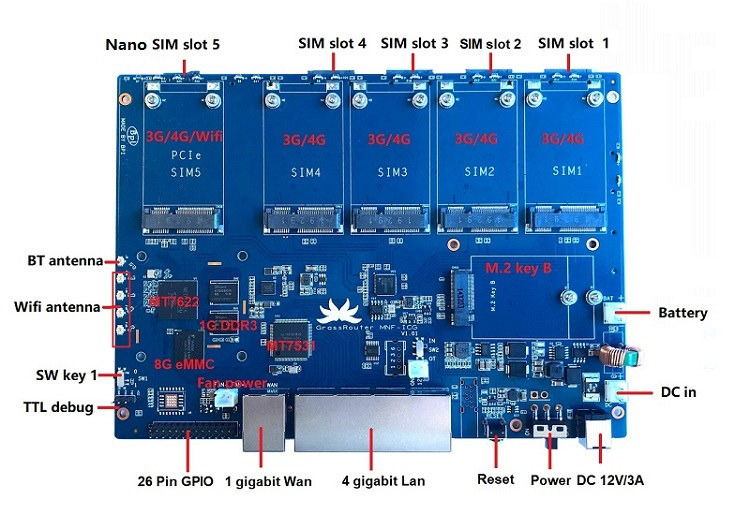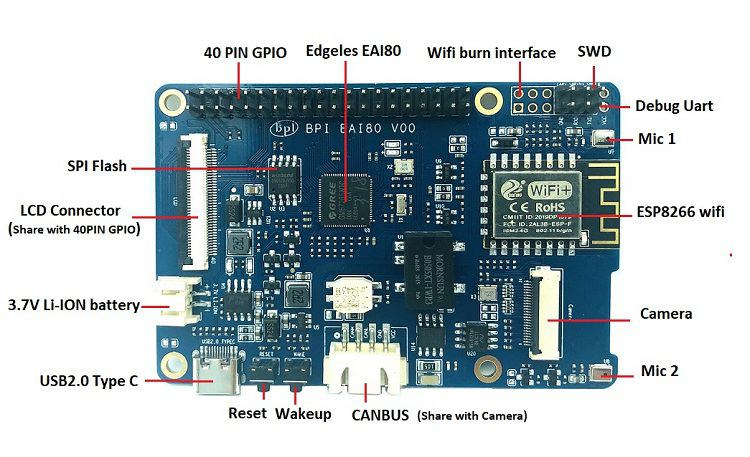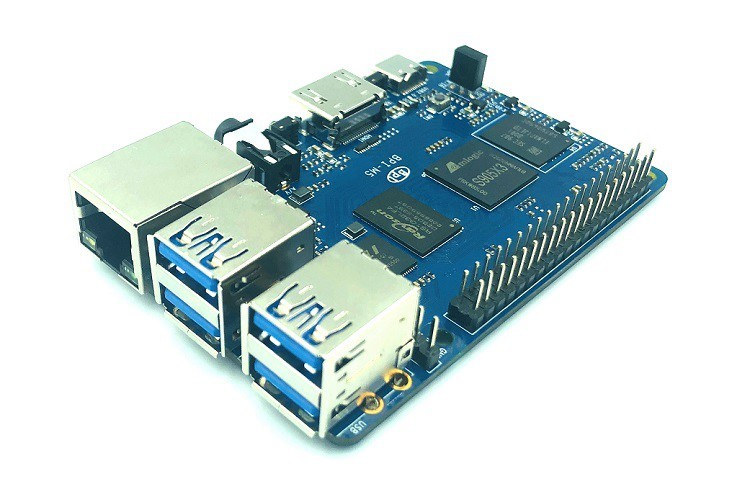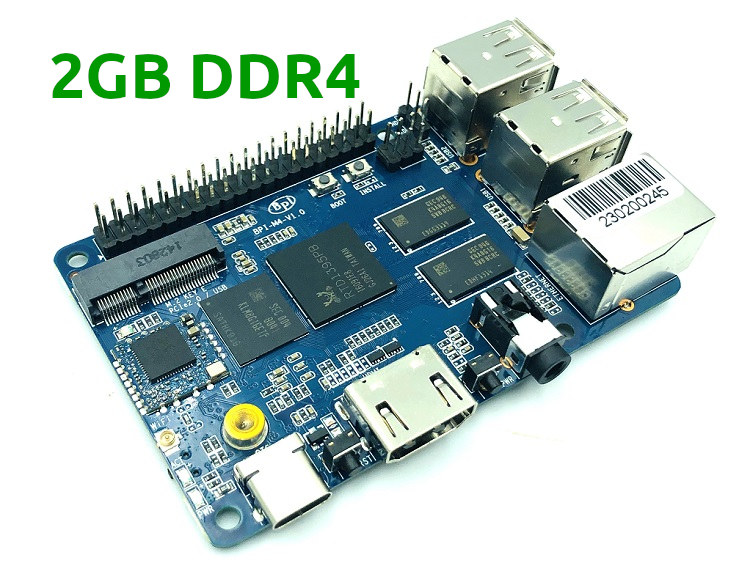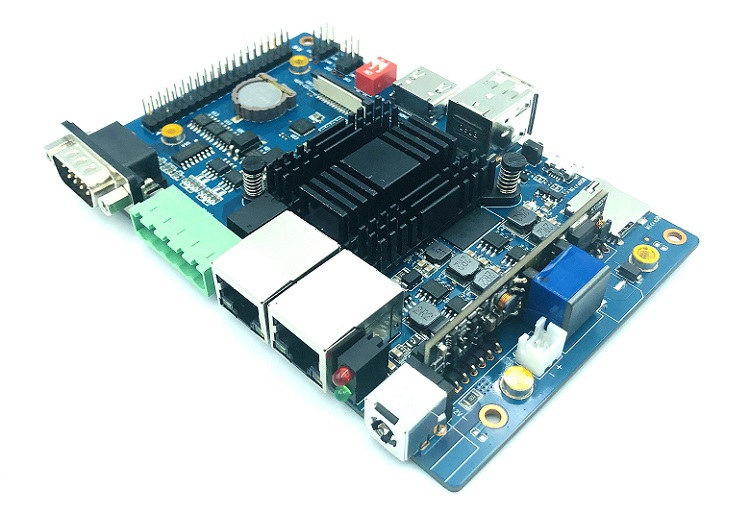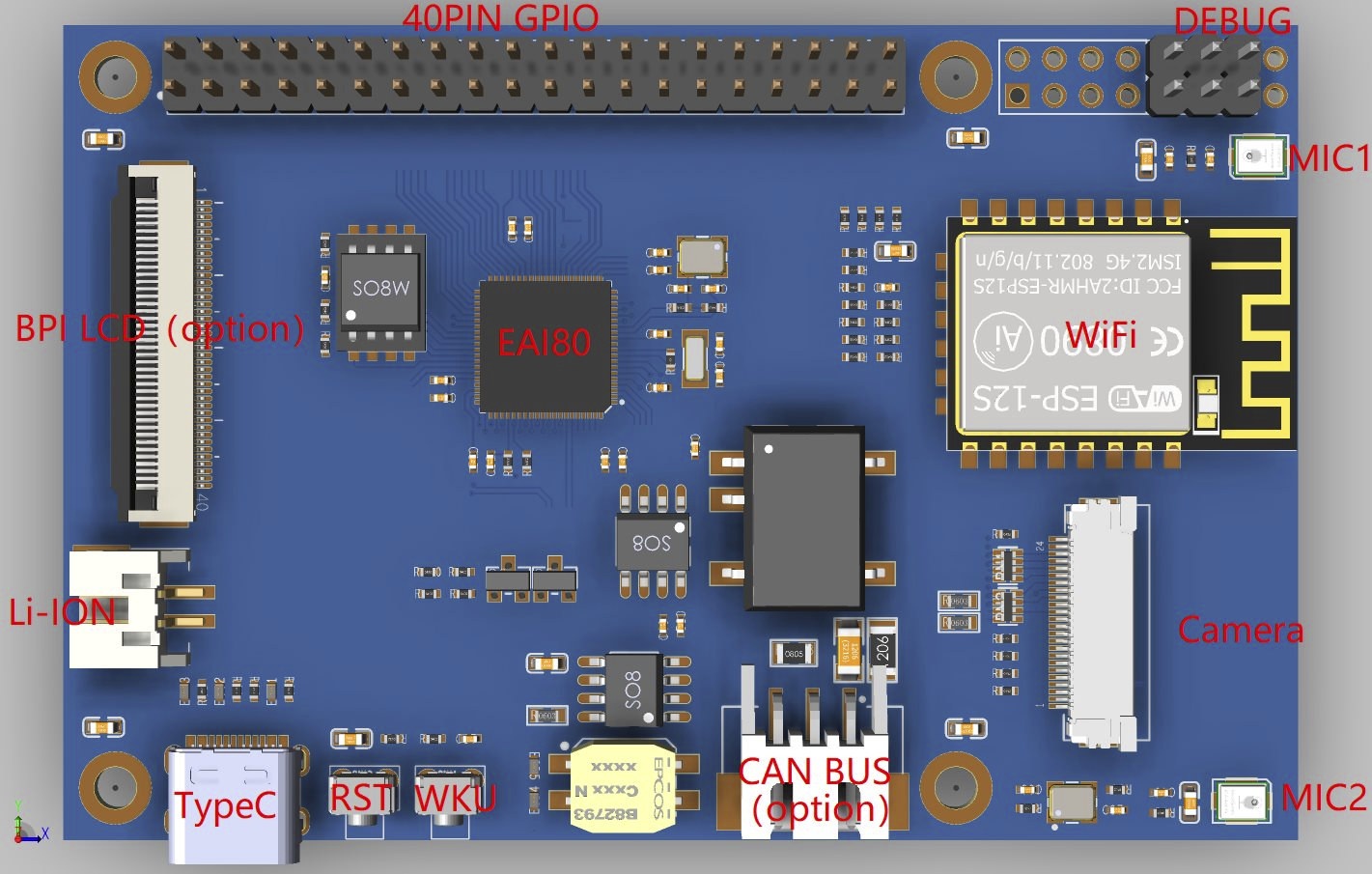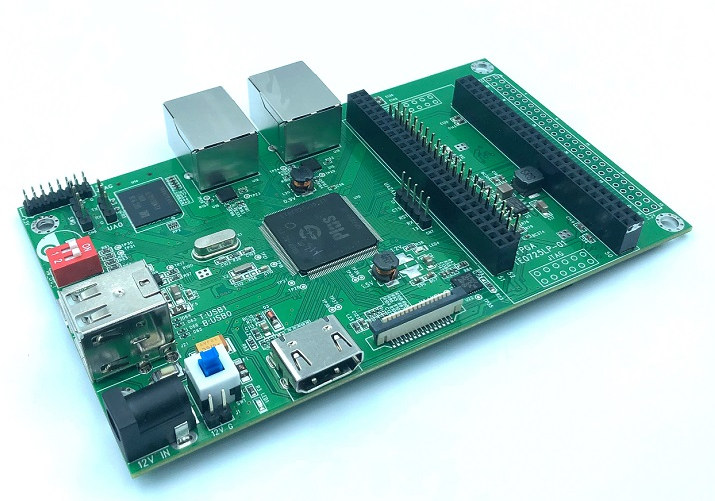One Banana Pi customer asked them to customize Banana Pi BPI-R64 Linux router board based on MediaTek MT7622 WiFi processor as part of their “BPI 4.0 server” OEM/ODM customization service. Specifically, they were asked to design a cellular gateway board with the same five Gigabit Ethernet ports as on the original board, but adding five mini PCIe sockets and SIM card slots for 3G/4G cards, and one M.2 socket plus two SIM cards for a 5G module. Here’s the result! Banana Pi “GrassRouter” cellular gateway board specifications: SoC – MediaTek MT7622E dual-core ARM Cortex-A53 processor @ 1.35GHz System Memory – 1 or 2GB RAM Storage – 8GB eMMC flash, MicroSD card slot Connectivity Cellular 1x 5G via M.2 Key-B module (USB 3.0 or PCIe bus), 2x SIM card slots. Up to 5x 3G/4G LTE via mPCIe expansion socket, 5x SIM card slots Ethernet – 5x Gigabit Ethernet ports (4x LAN […]
$16 Banana Pi BPI-EAI80 Cortex-M4F Board Embeds AI Accelerator, WiFi Module
Last April, we wrote about Edgeless EAI-Series dual Arm Cortex-M4 MCU equipped with a 300 GOPS CNN-NPU for AI at the very edge as we had discovered the chip in an upcoming Banana Pi board. It turns out Banana Pi BPI-EAI80 development board powered by Edgeless EAI80 AI microcontroller has just launched for $16 on Aliexpress, or you could get a complete kit with a touchscreen display, a camera, and a USB power supply for $80. Banana Pi BPI-EAI80 development board specifications: System-in-Package – Edgeless EIA80 dual-core Cortex-M4F microcontroller @ 200MHz with 300GOPS AI accelerator (CNN-NPU), 384KB of SRAM including 256KB for CNN-NPU, and 8MB SDRAM Storage – SPI flash Display I/F – LCD connector up to 1024×768 Camera I/F – 1x DVP camera interface Audio – 2x onboard microphones Connectivity – 2.4GHz 802.11b/g/n WiFI 4 using ESP8266 module USB – 1x USB 2.0 Type-C port Expansion 40-pin GPIO header […]
Banana Pi BPI-M5 Amlogic S905X3 SBC coming soon
Banana Pi BPI-M5 is an Amlogic S905X3 SBC following the Raspberry Pi form factor, and that is pretty similar to Hardkernel ODROID-C4 launched earlier this year with the same quad-core Cortex-A55 processor. BPI-M5 comes with 4GB LPDDR4 RAM, 16GB eMMC flash, and offers four USB 3.0 ports, one Gigabit Ethernet port, and on HDMI 2.1 output port for 4K/8K video output. Banana Pi BPI-M5 preliminary specifications: SoC – Amlogic S905X3 quad-core Cortex-A55 processor @ up to 2.0 GHz with Mali-G31 MP2 GPU @ 650Mhz System Memory – 4GB LPDDR4 Storage – 16GB eMMC flash (option up to 64GB), MicroSD slot up to 2TB Video Output – HDMI 2.1 up to 4Kp60 with HDR, CEC, EDID Audio – 3.5mm audio jack, digital HDMI audio Connectivity – Gigabit Ethernet USB – 4x USB 3.0 ports via VL817 hub controller, 1x USB-C port (for power only?) Expansion – 40-pin Raspberry Pi header with […]
Banana Pi BPI-M4 SBC Gets 2GB RAM, Sells for $43
First unveiled in February 2019, Banana Pi BPI-M4 is a single board computer based on Realtek RTD1395 quad-core Cortex-A53 4K media processor and following Raspberry Pi 3B+ form factor pretty closely. BPI-M4 officially launched in June 2019 for just $38 with 1GB DDR4 RAM, but despite the 2GB RAM option being listed in the specification, the 2GB version of the board was not available, at least on Aliexpress. The good news is that Banana Pi BPI-M4 with 2GB RAM has just started selling for $43 plus shipping on Aliexpress, or in Taobao if you based in China. Banana Pi BPI-M4 2GB specifications: SoC – Realtek RTD1395 quad-core Arm Cortex-A53 processor with Mali-470 MP4 GPU System Memory – 2GB DDR4 RAM Storage – 8GB eMMC flash, micro SD slot up to 256GB, M.2 NVMe SSD Video Output – HDMI 2.0b port up to 4K @ 60 Hz, HDR support Video Decode […]
Banana Pi BPI-F2P Industrial Control Board Adds PoE, RS-232 and RS-485 Interfaces
At the end of Last year, we covered Banana Pi BPI-F2S Industrial SBC powered by Sunplus SP7021 “Plus1” SoC with four Cortex-A7 core, an Arm A926 microprocessor, an 8051 core, as well as 128MB to 512MB built-in DDR3 RAM. The company has now unveiled Banana Pi BPI-F2P with the same processor and many of the same features, but with the addition of PoE support on one of the Fast Ethernet ports, as well as an RS-232 DB9 connector, and RS-485 terminal blocks. The expansion connector for an FPGA board found in BPI-F2S is however gone. Banana Pi BPI-F2P specifications: SoC – Sunplus SP7021 “Plus1” with a quad-core Cortex-A7 processor @ 1.0 GHz, one Arm A926 microprocessor, an 8051 core to handle I/Os, and 128MB or 512MB DDR3 DRAM. Storage – 8GB eMMC flash, microSD card slot Video Output – HDMI 1.4 output Camera I/F – MIPI CSI connector Connectivity – […]
Edgeless EAI-Series Dual Arm Cortex-M4 MCU Features a 300 GOPS CNN-NPU
Microcontrollers will have an important role to play in AIoT (AI + IoT) applications as they provide the lowest cost and power consumption. Performance is limited but we start seeing MCUs with AI accelerators such as GreenWaves GAP9 multi-core RISC-V microcontroller or Kendryte K210 RISC-V MCU with a KPU AI accelerator. Another option is by Edgeless Semiconductor Co. Ltd (零边界集成电路有限公司) based in Zhuhai, China, and more specifically its Edgeless EAI-Series dual-core Arm Cortex-M4 microcontrollers equipped with a 300 GOPS CNN NPU. Edgeless EAI specifications: CPU – Dual Arm Cortex-M4F @ up to 200Mhz, with DSP instructions, I/D cache for high performance; 500DMIPS/1.25DMIPS/MHz (Dhrystone2.1) AI Accelerator – CNN-NPU clocked at up to 300MHz with 300 GOPS peak throughput; 144MAC/cycle, EER up to 1TOPS/W, for image recognition scenario. Support major CNN Models including Resnet-18, Resnet-34, Vgg16, GoogleNet, Lenet, etc.. Support Convolutional kernel size 1~7 Support Channel/Feature No. up to 512 Support Max/Average […]
Banana Pi BPI-F2S Industrial SBC Launched for $58 with Linux 4.19 based Debian or Fedora OS
Last month we covered Banana Pi BPI-F2S single board computer (SBC) for industrial, IoT, and smart audio application that was powered by the intriguing SunPlus SP7021 “Plus1” processor featuring four Cortex-A7 cores, one ARM9 ARM9 real-time core, and one 8051 I/O controller core, as well as up to 512MB built-in DDR3 RAM. At the time, the board was not available, and we had limited information about software support, except the company would provide a Yocto-based Linux distribution. The good news is that you can now buy Banana Pi BPI-F2S industrial SBC on Aliexpress for $58 and Taobao for 390 RMB, and the company released source code and OS images for the board. Here’s a reminder of Banana Pi BPI-F2S specifications: SoC – Sunplus SP7021 “Plus1” with a quad-core Cortex-A7 processor @ 1.0 GHz, one Arm A926 microprocessor, an 8051 core to handle I/Os, and 128MB or 512MB DDR3 DRAM. Storage […]
Banana Pi BPI-F2S SBC is Powered by SunPlus SP7021 Processor, Supports Xilinx Artix-7 FPGA Add-on Board
BPI Tech, a spinoff from SinoVoIP, has introduced a new single board computer with Banana Pi BPI-F2S powered by SunPlus SP7021 “Plus1” SoC with four Cortex-A7 cores, one older ARM9 real-time core, and one even older 8051 IO controller. The chip also embeds up to 512MB DDR3 memory. The board comes an 8GB flash, dual Fast Ethernet, HDMI, a 40-pin Raspberry Pi compatible GPIO header, as well as headers for an optional Xilinx Artix-7 FPGA expansion board. Banana Pi BPI-F2S SBC Specifications: SoC – Sunplus SP7021 “Plus1” with a quad-core Cortex-A7 processor @ 1.0 GHz, one Arm A926 microprocessor, an 8051 core to handle I/Os, and 128MB or 512MB DDR3 DRAM. Storage – 8GB eMMC flash, microSD card slot Video Output – HDMI 1.4 output Camera I/F – MIPI CSI connector Connectivity – 2x 10/100M Ethernet USB – 2x USB 2.0 host ports, 1x micro USB port Expansion 40-pin GPIO […]


